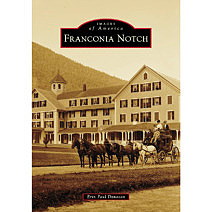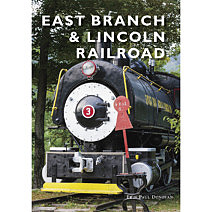East Branch & Lincoln Railroad, Trestle No. 16 – Trestle 16 is located along the abandoned East Branch & Lincoln Railroad in the Pemigewasset Wilderness of New Hampshire. It is also referred to as Black Brook Trestle and the J.E. Henry Trestle. Trestle 16 is one of the few remaining trestle artifacts that remind us of what took place in the area we know today as the Pemigewasset Wilderness.
From 1893 to 1948 the Pemigewasset Wilderness was the scene of massive logging operations by timber baron J.E. Henry and in later years the Parker Young Company. Both operated log trains over this trestle.
Built in the early 1900s, probably 1906-1907, under the supervision of Levi “Pork Barrel” Dumas, Trestle 16, which crosses Black Brook (Bear Brook on older maps) near the old Camp 16 site, played an important role in transporting logs from the remote regions of the Pemigewasset Wilderness. The last log train rolled over this trestle most likely in the summer or fall of 1946, not long after the Cedar Brook operation was completed.
It is hard to believe that this decaying trestle once held the weight of locomotives like the Porter 50 ton saddle tank engine (above) on display at the entrance to Loon Mountain. The Porter at Loon may have only been used on the lower portions of the East Branch & Lincoln, but locomotives of the same size crossed Trestle 16 daily.
Sheet metal that was placed on top of the trestle (underneath the tracks) may have helped slow down the decay process because water can't easily penetrate the timbers. This could explain the trestle’s incredibly long life span. And it is possible this is the only logging railroad timber trestle still standing in New Hampshire.
Trestle 16 was one of the few trestles that survived the flood of November 1927. The November flood caused extensive damage throughout the White Mountains, and a number of trestles along the East Branch & Lincoln Railroad were washed out.
In 2011, Tropical Storm Irene caused destruction throughout the White Mountains. Amazingly, Trestle 16 survived, but did receive damage. One of the stone abutments washed out causing a section of the trestle to drop about two feet. Most of the rocks on the right in the above image are from the abutment that washed out.
Now in the twenty-first century, Trestle 16 is rotten beyond belief but somehow still handles the weight of snow. Someday the forest will reclaim this area, and this historic trestle will be forgotten, and only pictures will be proof that it ever existed. The building of Trestle 16 maybe one of Levi Duma’s greatest accomplishments.
July 2018 Update: For over 100 years trestle 16 has stood in Lincoln Woods. It survived every major weather event that blew through New Hampshire. And over the years it became an attraction among railroad buffs, but the rotten timbers have finally let go. Its believed the section of trestle that crosses over the brook collapsed in late May or early June 2018. The above photo shows how the trestle looked in July 2018.
All of the above photos can be licensed for publications by clicking on the photo you are interested in. And you can view more photos of Trestle 16 here.
Happy image making..
© Erin Paul Donovan. All rights reserved | Historic Information Disclaimer | Purchase Our EB&L Railroad Book
Bibliography:
Donovan, Erin Paul. East Branch & Lincoln Railroad. Charleston, SC: Arcadia Publishing, 2018.
Gove, Bill. J.E. Henry’s Logging Railroads: The History of the East Branch & Lincoln and the Zealand Valley Railroads. Littleton, NH: Bondcliff Books, 2012.
Kinnison, B.H. The Flood of November, 1927. Washington, DC: Government Printing Office, 1929
Taylor, L. William. Railroad in the Wilderness: The East Branch & Lincoln Railroad, 1892-1948. Concord, NH: Historical New Hampshire, Winter 1993, pp. 187-239.
Owner of ScenicNH Photography LLC
Erin Paul is a professional photographer, writer, and author who specializes in environmental conservation and historic preservation photography mainly in the New Hampshire White Mountains. His work is published worldwide, and publication credits include: Appalachian Mountain Club, Appalachian Trail Conservancy, Backpacker Magazine, and The Wilderness Society. He has written two photo history books about the White Mountains: the East Branch & Lincoln Railroad (2018) and Franconia Notch (2024).











I have not been there for some time. I do remember that when I was a teenager in the late 1960's the old Camp 16 Shelter was still there and you could still hike across the trestle.
Hi Karen,
It’s a shame that the trestle collapsed, it was a great piece of railroad history.
I hiked out to the trestle last week and it's still in about the same shape as when I was out that way in September of 2018.
It’s a great piece of White Mountains railroad history.
I don't know how I missed this, but I just caught on about this happening through another source. I can confirm it happened somewhere between May 8 and June 16. You might have tighter dates, but that's what I've got. No abnormal streamflows on the E. Branch in Lincoln, so I'm presuming the strain finally did it in.
Hi Mike,
Yes, the old trestle finally gave in. It doesn’t seem like a weather event caused it to fall – Just old age and rotten timbers. I am surprised it lasted this long…
The sheet metal on top of the timbers were used for fire prevention. Steam locomotives have a tendency to drop hot ash and clinkers on the tracks.
Thanks for commenting. I did a very poor job trying to explain why the sheet metal may have helped in preserving the timbers all these years. I will update the paragraph when I get a chance.
There is documentation of a Henry Waldo, a forester who worked for Parker Young, stating that the trestles and bridges were covered with sheet metal on the top (below the ties) so that water would not penetrate the timbers.